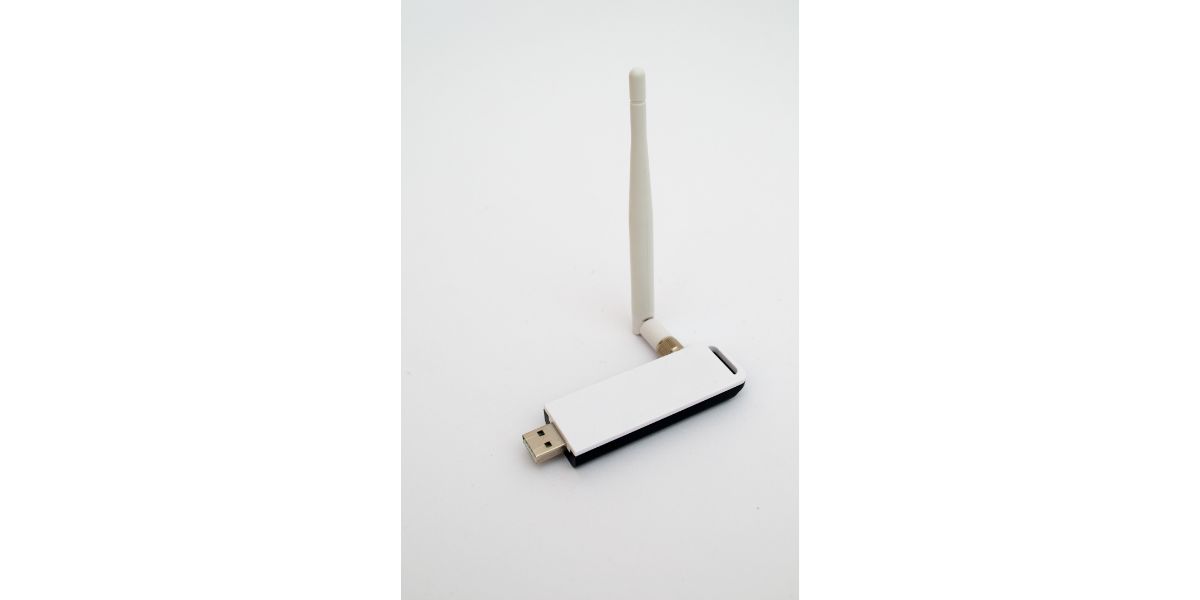Disclaimer: This post may contain affiliate links, meaning we get a small commission if you make a purchase through our links, at no cost to you. For more information, please visit our Disclaimer Page.
Although many people enjoy the stability of a wired internet connection, a wireless option has a convenience factor. You can connect multiple devices to the internet simultaneously with a simple Wi-Fi network connection. Additionally, you don’t have to worry about each one having a cable that links up to any internet hardware to maintain that connection.
There are a few ways to get your devices online wirelessly, but most modern ones already come with this functionality as part of their architecture. They have this capability thanks to the adapters that manufacturers usually use during development.
A Wi-Fi adapter is just one piece of the technology your devices might use to access the internet. In truth, these adapters also communicate with other internet-ready hardware to complete the connection. Although the setup processes for most of these units are mostly automatic, some people wonder about how the different kinds of components work in concert with each other.
Table of Contents
Is a Wi-Fi Adapter a Router? (What’s the Difference?)
Most people understand that their routers are a big part of what gives them internet connections throughout their homes or businesses. However, it may not be uncommon for some people to wonder if their adapters function the same way as routers. Although they are related equipment that help your devices with the internet connections you may want, they have different job descriptions.
In something like a computer, a wireless adapter is a particular piece of hardware that the manufacturer installs when building the unit. Although most modern computers should already have their adapters, you can also put one in your computer if it doesn’t.
Otherwise, some ways to add an adapter to your computer without opening it to put one inside. The Wi-Fi adapter is part of a single unit that allows the computer to communicate with nearby wireless networks. It can both send and receive crucial data that helps the computer get and maintain access to the network itself.
On the other hand, a wireless router communicates with a separate device from your internet service provider. The ISP will set up a modem, and this modem will bring an internet network signal into your home or business. Once this process is complete, a Wi-Fi router can find and get this signal from the modem. The router then sends that signal out and allows multiple devices to share its connection without needing a cable.
Each device can connect to a Wi-Fi network via the router, although you may need to know the network’s security key to gain access to it. When a phone, tablet, or computer connects to a network through the router, the router lists that device as a client. A single router can handle multiple clients at once. Therefore, the router and the adapter are both different and necessary parts of the internet hardware you might need.
Do Pre-Built PCs Come With a Wi-Fi Adapter?
Many personal computers you can buy right from a store will already have Wi-Fi capability. However, this is not necessarily true for all desktop computers today. Because of their customizable nature, some computers in this form factor may not come with their own Wi-Fi adapters.
Any consumer looking to get a new PC must look at the individual system specifications for the model they might want. The manufacturer will tell you whether the computer is ready for a Wi-Fi connection with the hardware it already has. Conversely, any laptop you buy today should have a built-in Wi-Fi adapter or card support to get an internet connection.
Many desktops also have this support as an inherent part of their designs. Small cards part of the motherboard have the necessary components to help the computer connect to the internet. Those desktop rigs that do not have this option right from the box usually have an ethernet port on the board.
Ethernet is a connection to the internet that uses a cable. However, many people prefer this option for any high-performance online work that requires sending or receiving lots of data. They want a way to transfer this data throughout the internet while minimizing the risk of any loss or interference that could mess up the signal. Wireless connectivity is convenient, but a cable connection via ethernet ports tends to have more stability.
If your desktop doesn’t have wireless capabilities, you can purchase your own adapter to install. Should that prove difficult, USB dongle devices can achieve the same effect just by interfacing with one of the USB ports on the computer. Wi-Fi adapters are much more of a given in laptops, but this has a lot to do with the size of the form factor.
Many manufacturers are making laptops with increasingly thin profiles, and some of the ports you might be familiar with on older models are disappearing on some of the newer ones. The ethernet port is one such possibility, with many manufacturers assuming that laptops might commonly work with wireless connections.
Does a Wi-Fi Adapter Increase the Performance of a Network?
A good Wi-Fi adapter can increase the speed or performance of your Wi-Fi network. However, it is not a given that this will happen. You should consider a few factors before deciding to rush out and buy the best Wi-Fi adapter on the market. At the basic level, your Wi-Fi network speed is something your internet service provider will determine.
Your ISP probably offers multiple tiers of service from which you can choose. At each tier, the company will give you different maximum speeds you can take advantage of when setting up your home network. If you need fast speeds for a lot of network traffic, it may be a good idea to purchase the highest tier of service you can.
Should you decide to go with a lower tier, your internet speed will cap out at whatever the limit is for that service package. In other words, there isn’t any equipment you might use to be able to push the speeds beyond that limit. Similarly, your internet service provider could experience some issues from time to time.
Various scenarios could result in temporary dips in your stability or internet speeds, and you’ll have to wait out these situations. If you’re experiencing any speed issues that seem to be lasting a long time, you can call your service provider to see if the problem is with the hardware on your end.
However, if there is no problem with your ISP or equipment, it is possible that a good Wi-Fi adapter could increase your network’s performance. There are various links in the internet chain, and your connection to the web can only be as speedy as the slowest link you have.
If that link is an aging or failing adapter, a better model can improve the speeds that you get. What’s happening here is not that your internet speed is improving by itself. Rather, the adapter may be helping your device communicate more seamlessly with the router.
Better communication from your device to the rest of your internet equipment is a big part of what can get you the top speeds for which you pay your ISP. This is why some people prefer to have an ethernet connection. Such a connection usually provides the most stable communication between your equipment. Thus, you can usually get the top speeds this way.
Can You Use a USB Wi-Fi Adapter Without a Wi-Fi Card?
Typically, you should not need to have an active Wi-Fi card to use a Wi-Fi adapter. The main purpose of an adapter is to provide the connectivity that a built-in card would have given you if your device had one.
However, your motherboard and its components need to be in good working order. The adapter should work, but any physical damage to your board could prevent it from doing its job, and part of this service would be to use the adapter to provide Wi-Fi connectivity.
Can You Use Two Wi-Fi Adapters at the Same Time?
Yes, you can have two Wi-Fi adapters running at the same time. However, the benefits of such a setup could have limitations. Further, you may need to do some extra work to see any improvements here at all.
In most cases, the computer will only use one adapter at a time. You could set up two adapters to access the internet and connect to another wireless device. That said, you won’t see speed improvements without doing some channel bonding or using special software.
Conclusion
Wi-Fi adapters are integral to how computers can access the internet today. They are not the same as routers, but they help your devices communicate with routers. In turn, they form connections with modems and the web. Some adapters may be able to help you improve the speeds you get with your internet connection, but this would depend on where the bottleneck in your network occurs. You can also have two adapters running on the same system at once.


